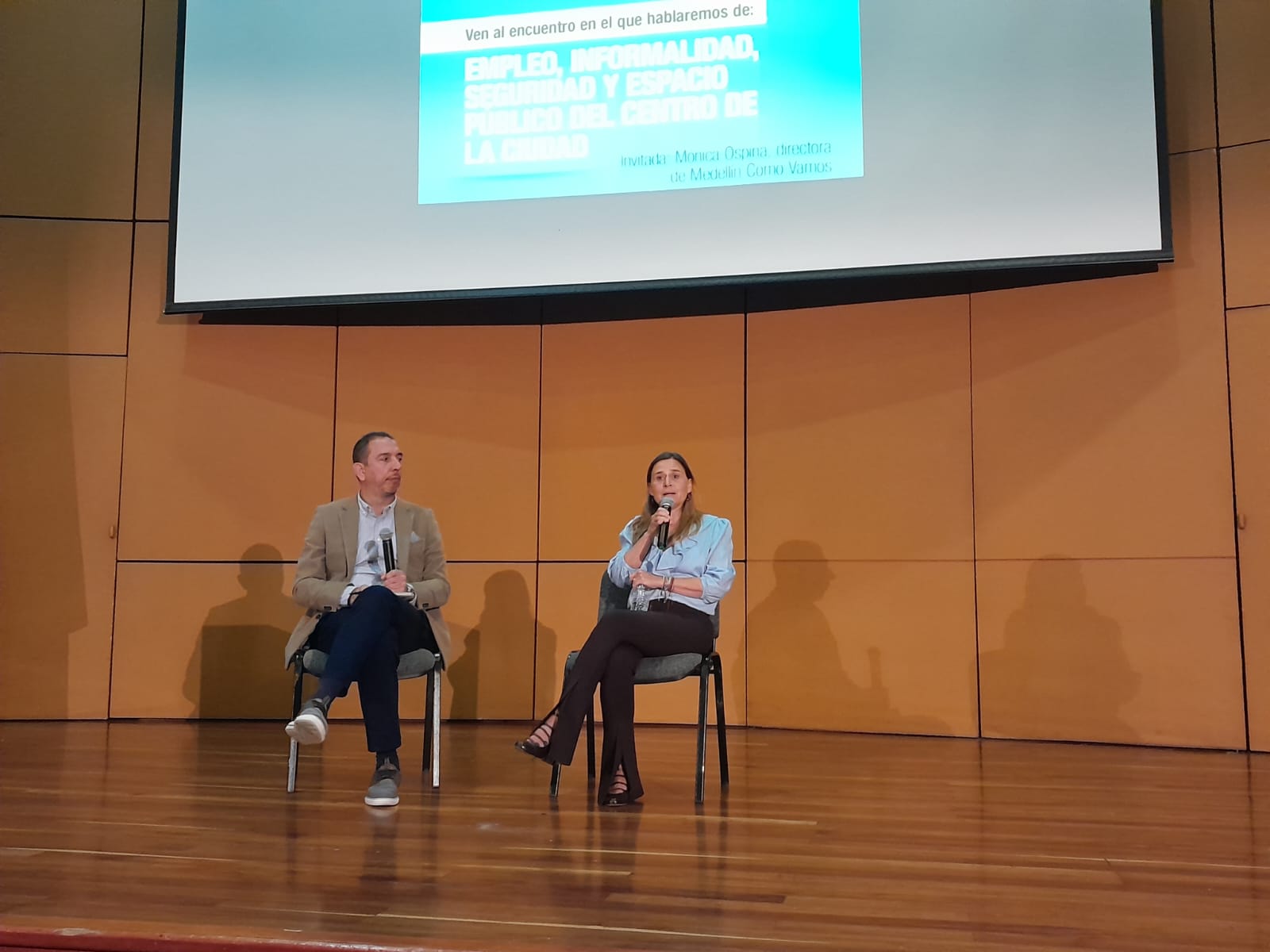By: Juan Moreno
Employment, informality, security and public space in the city center were the topics discussed at the most recent meeting of “Forums from the center, proposals for a better city”, organized by BODYCENTERthe Medellín Chamber of Commerce, the Public Improvement Society and the Bellas Artes University Foundation.
This time the guest was the director of Medellín Cómo Vamos, Monica Ospinaa private inter-institutional alliance that aims to monitor and analyze the quality of life in the city, with a metropolitan perspective in specific sectors.
In his speech, Ospina offered the “Kit for candidates for popular election positions in Medellín 2024-2027, a road map for the next government of Medellín and the City Council.” This document analyzes five dimensions: social agenda, social progress, inhabiting the city, citizen security and trust in public institutions.
Through perception and quality of life surveys made to citizens, conclusions are drawn that measure the pulse of how Medellín is doing in these items. “We have seen that the city has had an economic recovery with very positive figures, but we want to create an alert regarding these figures, because this is the city with the second highest budget in the country, so it is useless for us to occupy a higher position. down from second place. The gaps are increasing, we have greater inequality, there is greater poverty and that is worrying”, indicated the director.
Point by point
The analysis found that, in Medellín, in terms of the social agenda, the main concern is children at risk of malnutrition because there is the highest report of hunger in 17 years of measurements and the Buen Comienzo care program does not work as it should. Also, there are alerts due to the aging of the population and the large numbers of Venezuelan migration that arrives in the city. Regarding social progress, the deficit in the transit of students to higher education is a bottleneck that prevents guaranteeing successful educational trajectories. Unemployment figures for women and youth are still very high.
In the dimension of inhabiting the city, the perception that Medellinians have is poor management in the management of garbage and debris, the deterioration in the state of the roads and that there is a marked deficit of new housing and improvement for existing ones. People want the noise to be reduced, that the journeys do not take so long due to the amount of the circulating vehicle fleet.
Theft, extortion and domestic violence are the order of the day in Medellín according to the survey. These are the crimes that have the most complaints and the citizens ask that actions be taken against the territorial control of criminal gangs.
Finally, in the dimension of trust in institutions, it is urgent to strengthen governance networks to deal with public problems. The mayor’s office and the council of Medellín are the ones that need to recover the highest level of confidence.
Center
According to Monica Ospina“the main problem that we find in the center of the city is the qualitative housing deficit, the number of thefts reported, the deterioration of the houses, the departure of people who no longer want to live in the center, the increase in inhabitants street, the lack of public space and the Venezuelan migration that has settled in commune 10”.
The figures In Medellín, 29% of households where there are women and children have less than three meals a day, 11% of children were born with low weight and only 17.7% of babies are breastfed. 30,139 children are at risk of suffering from chronic malnutrition. In 9% of homes between 3 and 4 people sleep per room, 4.7% do not have access to aqueduct and 5.7% to electricity. In the last 18 years, the population of Medellín over 55 years of age has increased by 7%, that is, there are 437,230 people over that age, 17% of the total population, while those under 25 are increasingly less, in 2005 there were 872,596, today there are 843,987, they have dropped 10% and according to projections, in 2035 there will be 740,276. Ten years ago, 48% of households in the city had four or more members. Today, the highest percentage is taken by residences where one or two people live, with 43%. Between 2021 and 2023, 340,000 Venezuelan migrants have arrived in the department, the majority (62%), young people and children. Today, they make up 7% of the total population of Medellín, that is, approximately 179,830 people. The unemployment rate continues to be higher for women than for men. In 2022, more than 125,000 women did not find a stable job. 95% of the city’s educational institutions have structural problems. Medellín and Cartagena are the main cities with the worst Saber 11 tests. Of 100 children who start basic primary education, only nine will enter university. 40% of jobs in Medellín are located in the informal sector. The unemployment rate fell from 13.2 to 10.8 percentage points between 2019 and 2022.805,793 people live with less than $438,592 in monthly income and 191,098 with less than $164,075. 54.5% are women and 34% are under 17 years of age. In 2022, 28,142 complaints were filed for theft in Medellín, the highest rate in the last 17 years. There were also 12,109 complaints for domestic violence, a record for the same period. Women and minors were the most affected. In 2022 there were 391 homicides, the second lowest rate in the last 17 years after 2020 (pandemic). 54% of those surveyed are dissatisfied with the management of rubble in the streets, 53% complain about the amount of garbage and 48% about the high decibels of noise. It is the highest level of dissatisfaction in the last six years.
You may also be interested in: Recovered or regularized space? debate in the center of Medellín
You may also be interested in
